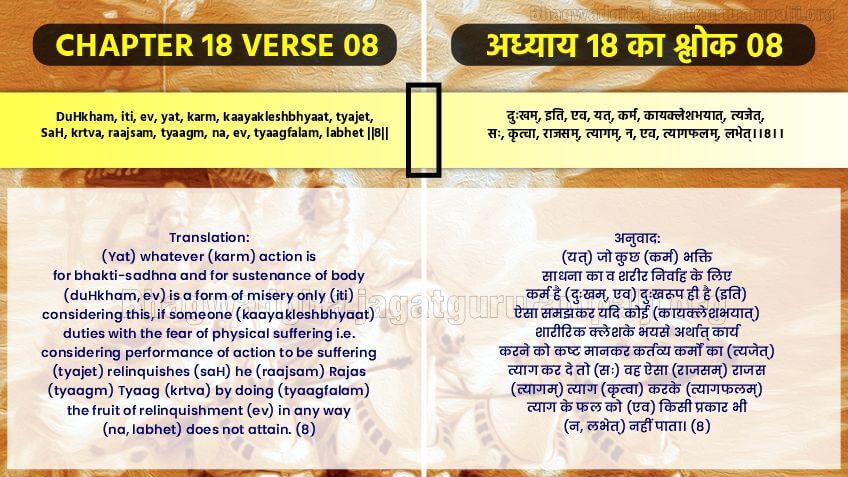
DuHkham, iti, ev, yat, karm, kaayakleshbhyaat, tyajet,
SaH, krtva, raajsam, tyaagm, na, ev, tyaagfalam, labhet ||8||
Translation: (Yat) whatever (karm) action is for bhakti-sadhna and for sustenance of body (duHkham, ev) is a form of misery only (iti) considering this, if someone (kaayakleshbhyaat) duties with the fear of physical suffering i.e. considering performance of action to be suffering (tyajet) relinquishes (saH) he (raajsam) Rajas (tyaagm) Tyaag (krtva) by doing (tyaagfalam) the fruit of relinquishment (ev) in any way (na, labhet) does not attain. (8)
Translation
Whatever action is for bhakti-sadhna and for sustenance of body is a form of misery only. Considering this, if someone relinquishes his duties with the fear of physical suffering i.e. considering the performance of action to be suffering, then he by doing this Rajas Tyaag does not attain the fruit of relinquishment in any way.
दुःखम्, इति, एव, यत्, कर्म, कायक्लेशभयात्, त्यजेत्,
सः, कृत्वा, राजसम्, त्यागम्, न, एव, त्यागफलम्, लभेत्।।8।।
अनुवाद: (यत्) जो कुछ (कर्म) भक्ति साधना का व शरीर निर्वाह के लिए कर्म है (दुःखम्, एव) दुःखरूप ही है (इति) ऐसा समझकर यदि कोई (कायक्लेशभयात्) शारीरिक क्लेशके भयसे अर्थात् कार्य करने को कष्ट मानकर कर्तव्य कर्मोंका (त्यजेत्) त्याग कर दे तो (सः) वह ऐसा (राजसम्) राजस (त्यागम्) त्याग (कृृत्वा) करके (त्यागफलम्) त्यागके फलको (एव) किसी प्रकार भी (न, लभेत्) नहीं पाता। (8)
